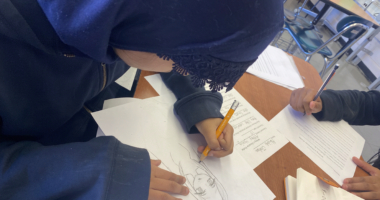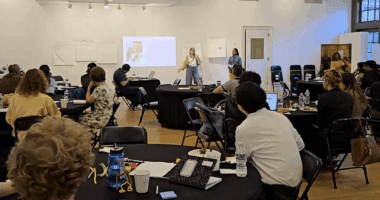
“Wherever you go, go with all your heart.” – Confucius
Cynthia Schmidt is a passionate believer in the power of words. She recognizes the profound importance of both human connections and the stories of our world, and therefore received her Bachelor’s degree from High Point University in both Human Relations and English Writing. She has decided to further her mission of pursuing academic and creative excellence with her MFA in Writing, Speculative Fiction track, at Sarah Lawrence College. Cynthia has had poetry published in both Apogee Literary Magazine and ThoughtCatalog online, and she is presently working on her debut novel.
TAP Work:
“In TAP I’ve learned so much: I’ve gotten some really helpful feedback on my lesson planning strategies, I’ve connected with such incredibly talented, passionate, and hardworking people in so many artistic fields, and I’ve learned so much about what it really means to live and work as a teaching artist today.”
Most Memorable TAP Moment:
“My most memorable TAP moment is almost every interaction I’ve had with my Care Team. It is just such an incredibly loving and supportive group of women who are all so extremely talented and raw and amazing. I feel so lucky to have gotten to know them over the course of the program.”
Find out more about Cynthia here:
“The Ethics of Owning a Genie”
By: Cynthia Schmidt
Raaza is as much a cynic as cynic gets. How could he not be, shackled onto a cosmic goddamn hamster wheel for eternity? He’s seen it all, been it all, done it all, vicariously if not physically. He is quite certain he knew everything there is to know about people, human nature at large. Humans are sticky, he thinks to himself. They mull around and fuck and fight and eat and shit and dream and disappoint and die. There’s not a one who would be altruistic for altruism’s sake, not a one who would make a wish without something for them to gain. Raaza looks into his water table, the defining feature of his living space. It is a gorgeous table, sleek black with smooth edges and still water settled into the shallow basin. The table is raised high so you can only see the top while standing up, and it has shaded glass panes running down the sides to view the tinted smoke swirling underneath, pressing contentedly against its own prison.
The water table sometimes has a bit of prophecy to show; other times it’s a pretty fixture, and other times still it serves as an unpleasant reminder. Raaza hates and loves this table very much, and no matter his feelings, he always looks into it at least three times a day without fail. The smoke under the table begins to swirl faster, and ripples appear at the top of the water. Raaza scrambles to his feet from the soft chair by the lamp and peers into the inky waters to glimpse what the table has to say.
In the water an image focuses, blurred slightly at the edges where the water laps it, waiting to swallow it back again. The scene shows an apple tree with a boy sitting under it. He is at the age where he is not yet a man but no longer a child, squarely in between the two. The boy looks up at the leaves of the tree and closes his eyes. Suddenly Raaza’s home shudders and lurches, and as if in response, the image dives back under the now choppy miniature maelstrom on the table’s surface. Raaza himself feels something akin to seasickness, a sensation that will never subside so long as he is at his current status, a tribute to the nature of his true powerlessness.
Abruptly, his surroundings cease their quivering and the overpowering smell of tart sweetness and earth permeates the air. Rolling his eyes, Raaza steadies himself, waiting for the inevitable. He settles himself into a comfortable position but remains ready to spring into action at the same time. There’s no way of knowing how long it will take for him to be summoned, so he is always unsure of what to expect. Fortunately, it doesn’t take long this time, as the feeling of being lifted stirs his insides once more. This time though, none of his fixtures shake; it is as if he is riding an elevator, merely waiting to reach the proper floor.
The reveal is Raaza’s favorite part. There is something quite funny to him as the self-appointed Supreme Cynic about puncturing other people’s cynicism. He loves watching the shock and wonder in their faces and thinks to himself if only they knew how grand a scale they exist on, and what a miniscule pinprick they will ever know, even after encountering him. One time, an arrogant boy some hundred years ago wished for the knowledge that Raaza himself possessed. Raaza was so offended that the whelp did not have the sense to ask for the strength or merit to acquire such knowledge in addition to the knowledge itself that he granted the boy’s wish just as he asked it. Of course, he paid the price for his game, as the boy naturally went insane and died before completing his other wishes. It was a long time before he was summoned again after that incident. Perhaps it was a punishment for him, or perhaps he brought it on himself. It didn’t particularly matter because that’s what happened and he couldn’t do anything else to change it.
Unable to resist some measure of theatricality, Raaza decides that he will at least set this initial encounter in a more unusual environment. A creative, he has prided himself all these years on manifesting an entirely unique setting for every new master’s introduction. Buzzing with the effort, he removes himself from his dwelling and begins to pull himself and his unsuspecting master into his creation.
The boy holding the most indescribably alluring apple he’s ever seen drops to his knees without even realizing it as his world shifts around him. Suddenly he is somewhere entirely different than the orchard he had been standing in not a moment before. Struggling to regain his footing, he marvels at his surroundings. He passes his hand through the multicolored mist around him, his mind unable to comprehend the sensation. He looks up and sees a figure walking towards him, and doesn’t even have the good sense to be frightened.
Raaza stands before his new master, analyzing him. Sometimes he plays this game, depending on the level of his boredom. He stands and waits to see how the human will react, not saying a word to see how they will approach him. He likes to see how their wonder turns to anger, entitlement, desperation, to get a measure of their mettle before he erases the experience from their minds. Raaza looks at the boy to decide if he is a wicked enough sort to deserve that unwitting insanity. The boy stares unabashedly back at him, mouth agape, his face holding an expression like witnessing a thousand supernovas. Raaza decides to be merciful and direct, determining that if he were to toy around with the boy, he would make a rather depressing stress ball for Raaza’s own pent up emotion. That would not be very productive for sport, but he does not want the boy to acquire an inflated sense of importance now that he has been spared initial torment whether he knows it or not. Raaza begins speaking in the thundering timbre that he knows rattles the boy’s bones. “Human,” he booms as the boy shakes, yet does not cower. “Your wish has been deemed sufficient and has summoned me here to you. Three wishes you will receive from me, but be warned of the duality of desire.” Raaza speaks the words he has spoken a thousand’s thousand times and cannot help but notice how well he hides his boredom from his tone.
The boy wears his bewildered awe plain on his face, and it is several moments before he can gather his ungatherable thoughts enough to attempt speech. With a voice surprisingly free of tremors, he first merely says, “Thank you, sir.” Raaza inclines his head, pleased by the boy’s initial respect and attempt at reverence. “Are there – are there any rules to my wishes?” he says hesitantly. The boy has not met his eyes, and Raaza wonders if this boy actually knows the truth of what he is.
“Yes,” Raaza says simply, waiting to see how much further his deceptively naïve master will press. The boy nods his head and tosses it to the side, affirming his suspicion. This will make for an interesting one, Raaza thinks to himself. I’m glad he’s not quite as dull and slow as the rest.
The boy straightens his back and seems to muster up some measure of courage. “What would you ask for, Mr. Djinni, sir?”
Raaza deflates a bit, having been asked this question several times before. Already he has disappointed himself, expecting this simple human to surprise him. He has forgotten that he knows everything about humans, has catalogued their desires and wishes, has dissected their dreams and secrets, mapped them so thoroughly that he can navigate them without having to open an eye. With no small measure of contempt, he looks down at the boy. “Do you expect me to say my freedom, boy? Is that what you want to hear? Are you the type of human who fosters that cruelty, to spark and fan what you know will be forever out of my reach? Don’t test me, boy, you won’t like the results. I think you must know what the wrath of a Djinni can bring, or are you as brainless as the rest of your kind?” Raaza finds himself surprised at the amount of rage the boy’s question provoked. At least, he is surprised he let it out, even in such small measure.
Unexpectedly, the boy has not shrunk. Rather, he has set himself more firmly in place, a ridiculous attempt seeing as they currently dwell within an intangible mist of Raaza’s creation. “What makes you think I won’t use one of my wishes to set you free? That could very well have been my plan, how could you know!”
Raaza scoffs, now extremely irritated by this ant who, despite his efforts, has quickly developed an incredibly elevated sense of importance. “Do you think you’re fucking Aladdin, is that it? You think this is a goddamn Disney movie with a happy fucking ending guaranteed from the opening credits? My opening credits rolled before your universe was born, how dare you think you know how my story goes?”
The smoke from the Djinni’s eyes mingled with the mist in the air that was not air. Realizing how dangerous the not-ground was that he was treading, the boy retreated downward in deference, sensing that any moment Raaza’s turquoise fire eyes may damn whatever rules existed and incinerate him on the spot. “Mr. Djinni, sir, I do not presume the foresight that you have,” the boy stammered, awkwardly trying to patch the situation.
The sight of the boy’s clumsy attempt at humility should infuriate him further, but Raaza finds it amusing instead. Something about this boy is certainly different from the rest. Perhaps there is time yet to be surprised, he thinks, even if only by myself. As he attempts to reign in his eyes from blaze to embers, he makes a sound resembling a snort. The boy starts from the noise, and Raaza notes that at least he has the good sense to be afraid. “Foresight is not my gift,” he says flatly, the flames of his lowering eyes roaming towards where he knows his water table lies beyond the mist. Then he looks at the boy’s hunched figure, his shoulders sloped down with his weight on his toes. It wouldn’t take any power from him to know that the boy is waiting for something to happen.
Sighing harshly, Raaza is suddenly overcome with an acute impatience. He quickly gestures for the boy to rise. “What is it that you desire, boy?” he says with an unexpectedly genuine curiosity. The mist around them swirls with anticipation.
Straightening, the boy looks at Raaza, any semblance of deference gone. He raises his eyes to the Djinni’s own, and speaks in a torrent of words. “The wish that brought you to me was one of escape. My mother is dead and my father is a joke of a man and the boy I loved is just as shallow and close-minded as the rest of the world. I wanted to escape my life, everyone in it, the whole fucking hamster wheel of boredom that I’ve been trapped in since I was born. Djinni, my first and only wish is for me to become one of you, to be your protégé and student of all things magic, that I may one day become enough to set us both free.”
Raaza for once, in all his eons of existence, is utterly shocked. He looks at this boy, this nobody whose arbitrariness was unfathomable, and truly sees him. He looks at him with pity and sorrow, a deep, heavy sadness settles over him to blanket any unexpected hope that might spring from his surprise. The buzzing sound around them is the only proof of the wish going to work, for Raaza says nothing. His only two thoughts are that he’ll have to set another place at the water table, and that he may have to start his theory of humanity over again.



